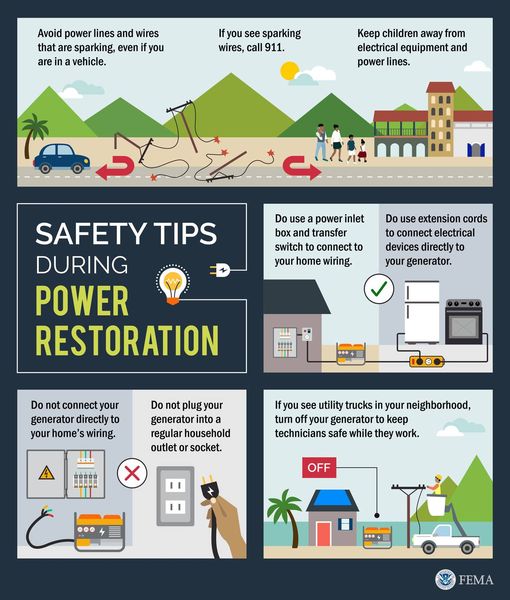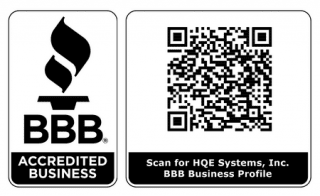Be Aware of Hazards
- Carbon monoxide poisoning
- Fire
- Electrocution
Safety Tips
Be sure to read the manufacturer’s instructions on how to use the generator.
Carbon monoxide poisoning
- Do not assume that you are safe. Carbon monoxide from generators is completely colorless and odorless, so you won’t know if it’s there. It could kill your family and your pets.
- Do not use a generator indoors or in partially enclosed spaces- including homes, garages, and crawl spaces – even those areas with partial ventilation.
- Do not operate near open doors and windows. Using fans will not prevent carbon monoxide build-up in the home.
- Install battery-powered carbon monoxide alarms inside your home to alert you of dangerous levels. Be sure to follow the manufacturer’s recommended placement.
Electrocution or electric shock
- Always connect the generator to appliances with heavy-duty extension cords.
- Hooking up your generator directly into your home power supply could increase the voltage or could cause a surge to the outside power lines and potentially injure or electrocute an unaware utility lineman. It also bypasses some of the built-in household circuit protection devices. Connecting the generator to your home could cause a surge in electricity that might result in injury or death to yourself or your family.
- Use a qualified electrician to install the appropriate equipment in accordance with local electrical codes or ask your utility company to install an appropriate power transfer switch.
Fire
- Keep your generator outside and fuel your generator outside.
- Do not store the fuel for your generator in your house. Gasoline, propane, kerosene, diesel, and other flammable liquids should be stored outside living areas in properly labeled, non-glass safety containers.
- Do not store fuel near a fuel-burning appliance, for example, a gas stove.
- If the fuel is spilled or the container is not sealed properly, invisible vapors from the fuel can travel along the ground and be ignited by the appliance’s pilot light or by arcs from electric switches.
- Before refueling the generator, turn it off and let it cool down. Gasoline or other flammable liquids spilled on hot engine parts could ignite, and invisible vapors from the fuel can travel along the ground and be ignited by the generator’s pilot light or by arcs from electric switches in the appliance.
Resources for additional information about generators and carbon monoxide:
- Generator safety video from Centers for Disease Control and Prevention (CDC) and FEMA which includes American Sign Language: youtube.com/watch?v=n7GIOzABRHA.
- Occupational Safety and Health Administration information about how to use portable generators safely at osha.gov/OshDoc/data_Hurricane_Facts/portable_generator_safety.pdf.
- CDC carbon monoxide video at cdc.gov/co/ or call 800-232-4636.
____________________
HQE Systems, Inc. | HQE is a FEMA Certified Minority-Owned Service Disabled Veteran Owned Small Business providing complete solutions for Mass Notification Systems, Electronic Security Systems, Software Development Services, Contract Support, and Prototyping Services. As a brand agnostic solutions provider, HQE prides itself on providing the BEST solution for the project. HQE possesses factory certifications and reseller licenses to ensure our clients receive the highest quality service at the lowest budget. HQE can provide complete design, installation, integrations, upgrades, and long-term maintenance support for any size and scope project.


